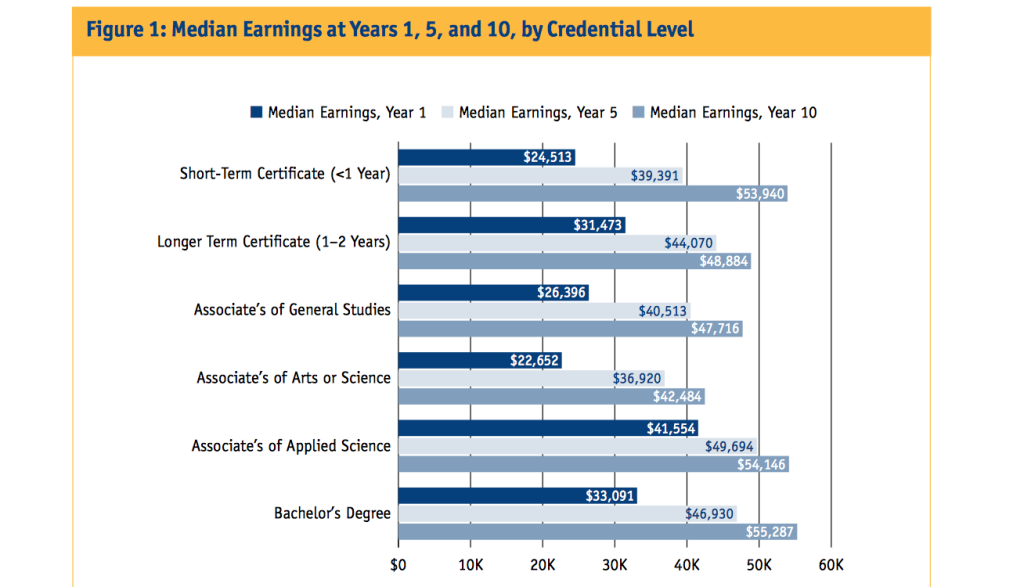Community college pays off for many graduates
We write mostly about four-year colleges because that’s where most of our clients choose to attend, and going to college is a wise investment in your future.
But as we’ve written before, community college can also be an affordable college option for many students–even if they don’t necessarily go on to get a bachelor’s degree.
Short term degree holders can earn more than B.A.s
In fact, a recent study of community college and four-year college graduates in Colorado and a few other states showed that many community college graduates with certificates were out-earning graduates with bachelor’s degrees, according to The Hechinger Report.
The chart below shows the median earnings for those with certificates, Associate’s and Bachelor’s degrees in Colorado. As you can see, graduates with bachelor’s degrees earn more than other graduates one, five, and 10 years after graduation.

In a few states, some community college graduates each earn more than those with bachelor’s degrees 5 and 10 years after graduation. [Image source: The Hechinger Report via Education Pays in Colorado]
Salaries are highly dependent on the field the graduate studied–and many graduates with more technical two-year degrees continue to out-earn those with bachelor’s degrees in certain fields even 10 years after graduation.
For example, the study found that two-year associate’s degree holders in an applied science were on average, nearly the same amount as graduates with their bachelor’s ($54,146 vs. $55,287).
And students with two year degrees in certain degrees, like fire protection, were making even more than the average B.A. ten years later–almost $73,000.
Even those who spent less than a year studying “hot” fields, such as health care diagnostics, made more than $54,000 after 10 years, according to the report. And the average short-term certificate holder made just barely less.
While these numbers shouldn’t deter students from pursuing four-year degrees than don’t tend to pay as well (such as those in the liberal arts), it’s important for students to remember than there are many types of education that can lead to good careers and salaries, and the path doesn’t have to look the same for everyone.
Bachelor’s degrees still the best investment
Of course, shouldn’t take this as a reason not to attend college, or to look at a shorter degree as a quick ticket to earning a high salary.
Graduates with four-year degrees are making more, on average, than the typical community college graduate or certificate holder.
Bachelor’s degrees tend to increase in value over time more quickly than community college degrees. For example, in Colorado, the median income for a 2002 college graduate was roughly $55,000 in 2012, a decade after completing the degree.
After those same 10 years, the typical community college graduate was making just $42,000–a difference of $13,000. And the difference between the two groups tends to grow over time as the salaries of those with bachelor’s degrees rise at a faster rate.
Job prospects are also greater for those who have a bachelor’s degree, and their unemployment rates are much lower than those with shorter degrees or no degree at all.
Making higher education affordable
Whether you plan to eventually get a bachelor’s degree or not, attending community college is a wise financial and educational move.
In many cases, students can save significant money on college by transferring to a four-year school after two years. And for students who intend to end their education there, there are options that can lead to good job prospects.
We help students make college more affordable–whether they attend a community college, public four-year school or private university. If you’d like to learn about how we can help you pay for college and get financial aid, give us a call toll-free at or contact us using this form.
affording college, choosing a college, community college, return on investment, salaries
